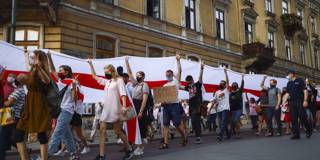OnPoint Subscriber Exclusive
Interviews feature exclusive interviews with prominent leaders and thinkers on issues of global importance.

A Light in the East
Although the peaceful protests in Belarus have yet to overturn the results of August's fraudulent presidential election, they have continued to grow. Here, Sławomir Sierakowski, having recently returned from Minsk, speaks with former European Council President Donald Tusk about what the events in Belarus mean for Europe.
BRUSSELS – After a month of massive peaceful marches, rallies, walkouts, and strikes in response to the fraudulent presidential election of August 9, Belarus remains in a state of political limbo. While the opposition continues to mobilize, Aleksandr Lukashenko, the president for the past 26 years, is clinging to power, exploring his options vis-à-vis Russia, and hoping the demonstrations will taper.